Divorce Notification Letter
[Your Name]
[Your Address]
[City, State, Zip Code]
[Email Address]
[Phone Number]
[Date]
[Spouse's Name]
[Spouse's Address]
[City, State, Zip Code]
Dear [Spouse's Name],
Subject: Divorce Notification
I hope this letter finds you well. With a heavy heart, I am writing to inform you that I believe it is in the best interest of both of us to proceed with a divorce. Over the past few months, we have both struggled to find common ground and resolve the issues that have been affecting our marriage. After careful consideration and reflection, I have come to the difficult decision that ending our marriage is the most appropriate course of action.
I want to emphasize that this decision was not taken lightly, and I understand the impact it will have on both of our lives. Despite the challenges we faced together, I sincerely appreciate the time we shared as a couple and the memories we created.
At this stage, I believe it is essential for us to part ways amicably and with mutual respect. I propose that we consider mediation or seek legal counsel to ensure a fair and equitable division of our assets, as well as arrangements for any children involved. My main priority is to minimize the emotional stress on all parties, especially our children, and find a solution that is agreeable to both of us.
I am willing to engage in open and honest discussions to reach a settlement that works for both of us. I hope we can move through this process with respect for each other and focus on rebuilding our lives separately while remaining responsible co-parents for our children.
I understand that this is a challenging time for both of us, and I am open to discussing any concerns or questions you may have regarding the divorce proceedings. It is my hope that we can move forward in a way that allows us to heal and grow individually.
Please feel free to reach out to me at any time to initiate discussions or to share your thoughts on the matter. If you believe that mediation is the best approach, I am open to exploring that option together.
Wishing you strength and resilience during this difficult time.
Sincerely,
[Your Name]
Formal Divorce Notification Letter
Subject: Notification of Divorce
Dear [Spouse's Name],
I am writing to formally notify you that our marriage has been legally dissolved as of [Date].
Please consider this letter as an official record of the divorce. I request that all joint accounts, property, and legal documents be updated to reflect this change. Should you require any additional legal documents or confirmation, please let me know.
Sincerely,
[Your Name]
Informal Divorce Notification Letter
Subject: Update Regarding Our Marriage
Hi [Spouse's Name],
I wanted to let you know that the divorce process has been finalized as of [Date].
I hope we can move forward amicably and coordinate on any shared responsibilities. Please reach out if you need copies of the legal documents or any clarification.
Best,
[Your Name]
Heartfelt Divorce Notification Letter
Subject: Notification of Divorce
Dear [Spouse's Name],
It is with a heavy heart that I write to inform you that our marriage has officially ended as of [Date].
While this is a difficult moment for both of us, I hope we can proceed with respect and understanding. I am available to discuss any matters related to our shared responsibilities or assets.
Sincerely,
[Your Name]
Provisional Divorce Notification Letter
Subject: Pending Divorce Notification
Dear [Spouse's Name],
This letter serves to notify you that a petition for divorce has been filed as of [Date], and legal proceedings are underway.
Please be advised that this is an initial notification and does not constitute a final decree. Further updates will follow as the legal process progresses. I encourage you to consult with your legal counsel for next steps.
Best regards,
[Your Name]
Official Divorce Notification to Third Parties
Subject: Divorce Notification
To Whom It May Concern,
Please be advised that [Spouse's Name] and I have been legally divorced as of [Date].
Kindly update all records, including joint accounts, insurance policies, and legal documents, to reflect this change. Attached are copies of the divorce decree for your reference.
Sincerely,
[Your Name]
[Contact Information]
What a Divorce Notification Letter Is and Why It Is Important
A Divorce Notification Letter formally informs the spouse or relevant third parties that a marriage has been legally dissolved.
Purpose:
- Provide official confirmation of the divorce.
- Ensure all legal and financial records are updated.
- Establish clear communication to avoid misunderstandings.
- Serve as documentation for legal or administrative purposes.
Who Should Send a Divorce Notification Letter
- The spouse who is formally notifying the other party.
- Legal representatives on behalf of a client.
- Individuals or parties responsible for communicating legal or administrative changes.
Whom the Divorce Notification Letter Should Be Addressed To
- The other spouse.
- Legal entities, such as banks, insurance companies, or government agencies.
- Any third party requiring official documentation of the divorce.
When to Send a Divorce Notification Letter
- Immediately after the divorce decree is finalized.
- During provisional or pending legal proceedings if required.
- When notifying institutions about changes in marital status affecting accounts or legal responsibilities.
How to Write a Divorce Notification Letter
- Begin with a clear subject line stating the purpose.
- Include the recipient's name and a formal greeting.
- State the legal finalization date of the divorce.
- Mention relevant action items, such as updating records or contacting legal counsel.
- Close respectfully with a signature and contact information.
Formatting Guidelines for Divorce Notification Letters
- Length: concise, 150–300 words.
- Tone: formal, respectful, and neutral; emotional or heartfelt tone may be used for personal notifications.
- Style: clear, professional, and structured.
- Mode: printed letter for official records; email may be used for informal notifications.
- Include subject line, greeting, body, closing, and signature.
Requirements and Prerequisites Before Sending
- Ensure the divorce decree or legal confirmation is finalized.
- Gather supporting legal documents such as court orders or official certificates.
- Verify recipient details for proper addressing.
- Consider consulting a lawyer for wording to prevent potential disputes.
After Sending a Divorce Notification Letter
- Confirm receipt of the letter with the recipient.
- Monitor updates to legal or financial records.
- Keep copies for personal and legal records.
- Follow up with any additional documentation if requested.
Common Mistakes to Avoid When Sending a Divorce Notification Letter
- Sending before the divorce is legally finalized.
- Using informal language in official notifications.
- Omitting important dates, details, or required documentation.
- Failing to retain a copy for personal or legal records.
- Not specifying clear next steps for action by the recipient.
Elements and Structure of a Divorce Notification Letter
- Subject line clearly indicating divorce notification.
- Salutation addressing the recipient.
- Clear statement of divorce finalization date.
- Relevant instructions or requests (record updates, document copies).
- Expression of respect or courtesy if applicable.
- Closing signature and contact information.
- Attachments if needed, such as a copy of the divorce decree.
Tricks and Tips for Effective Divorce Notification Letters
- Keep the tone neutral and professional, especially for official letters.
- Use bullet points when addressing multiple action items.
- Attach necessary legal documents to support the notification.
- Send via registered mail or email with read receipt for proof of delivery.
- Consider separating personal and formal notifications if addressing both spouse and institutions.
Compare and Contrast Divorce Notification Letters With Other Legal Notifications
- Similar to legal notices in clarity and formality.
- Differs from personal letters in that it documents legal changes.
- Alternative methods include direct email, registered mail, or through legal representatives.
- Unlike casual communication, these letters require accuracy, documentation, and official tone.

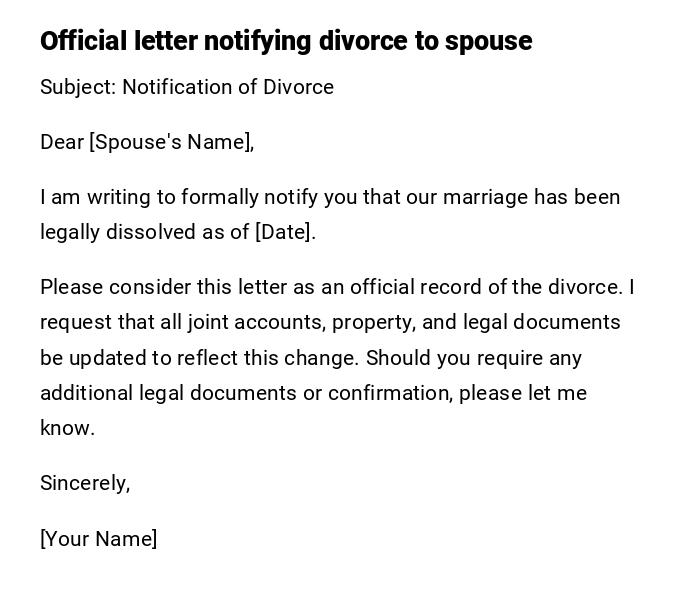
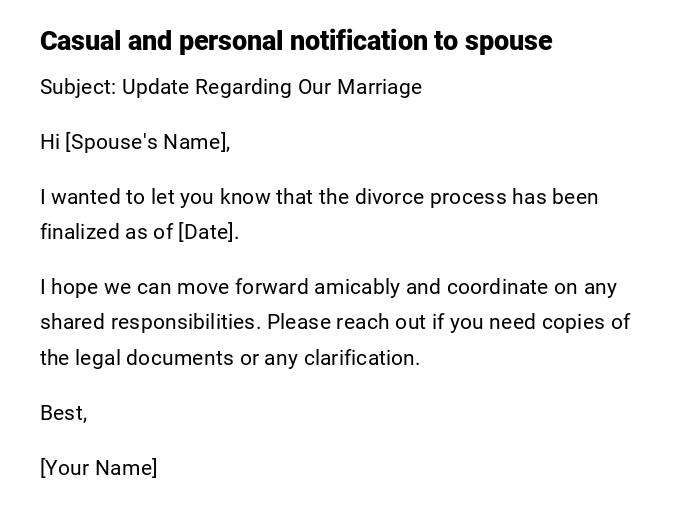
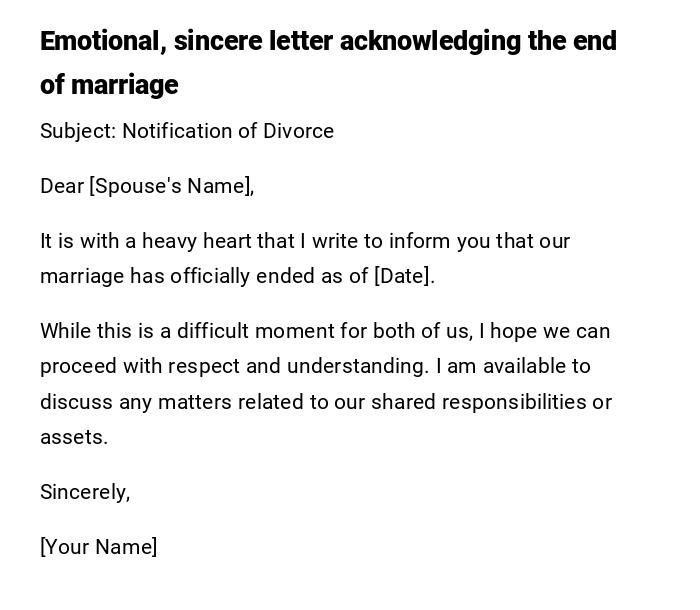
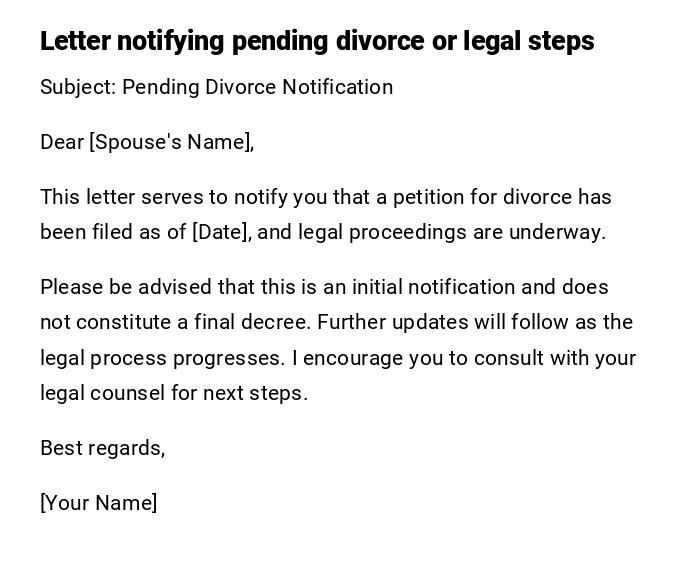
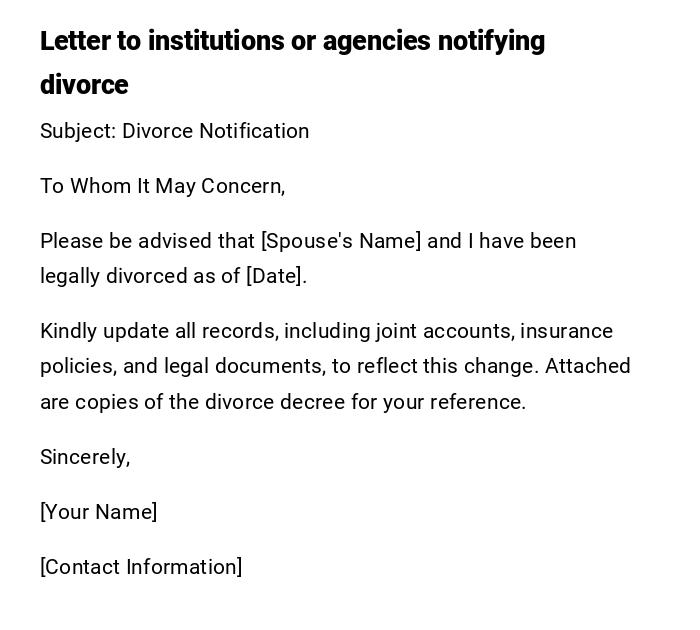

 Download Word Doc
Download Word Doc
 Download PDF
Download PDF